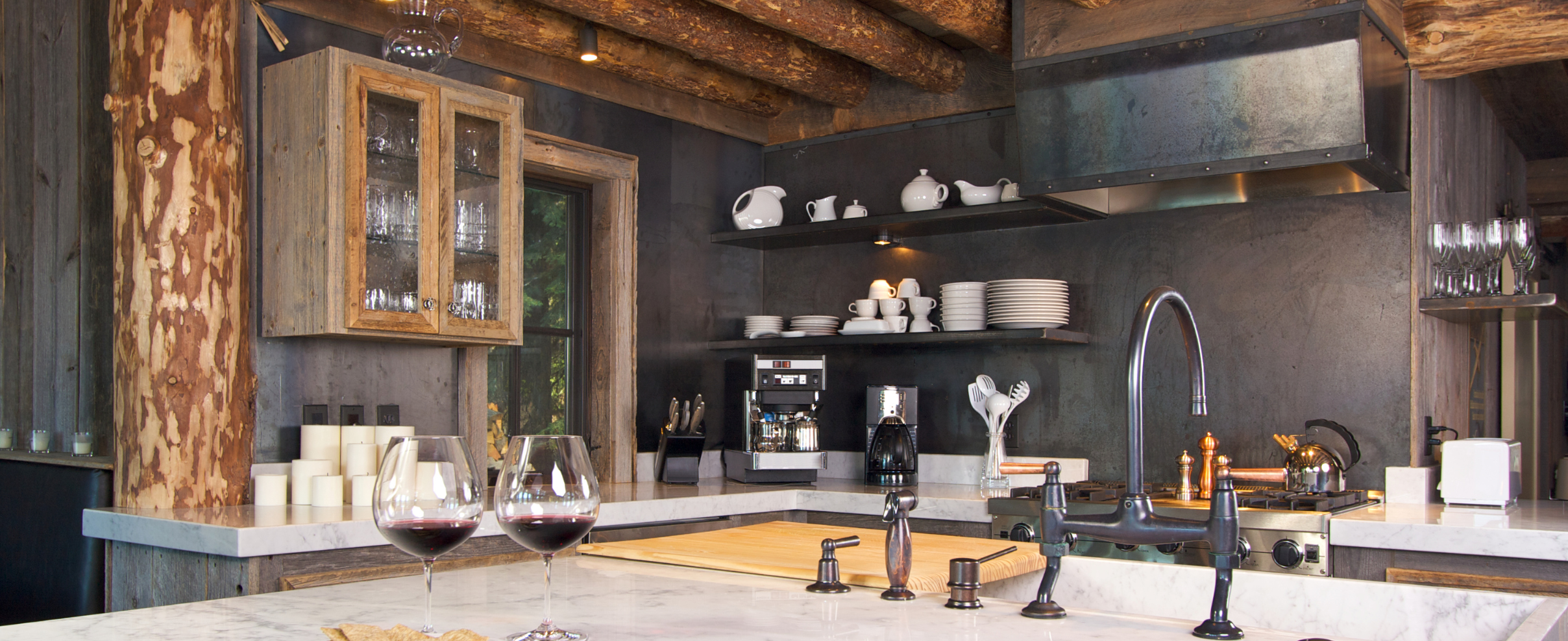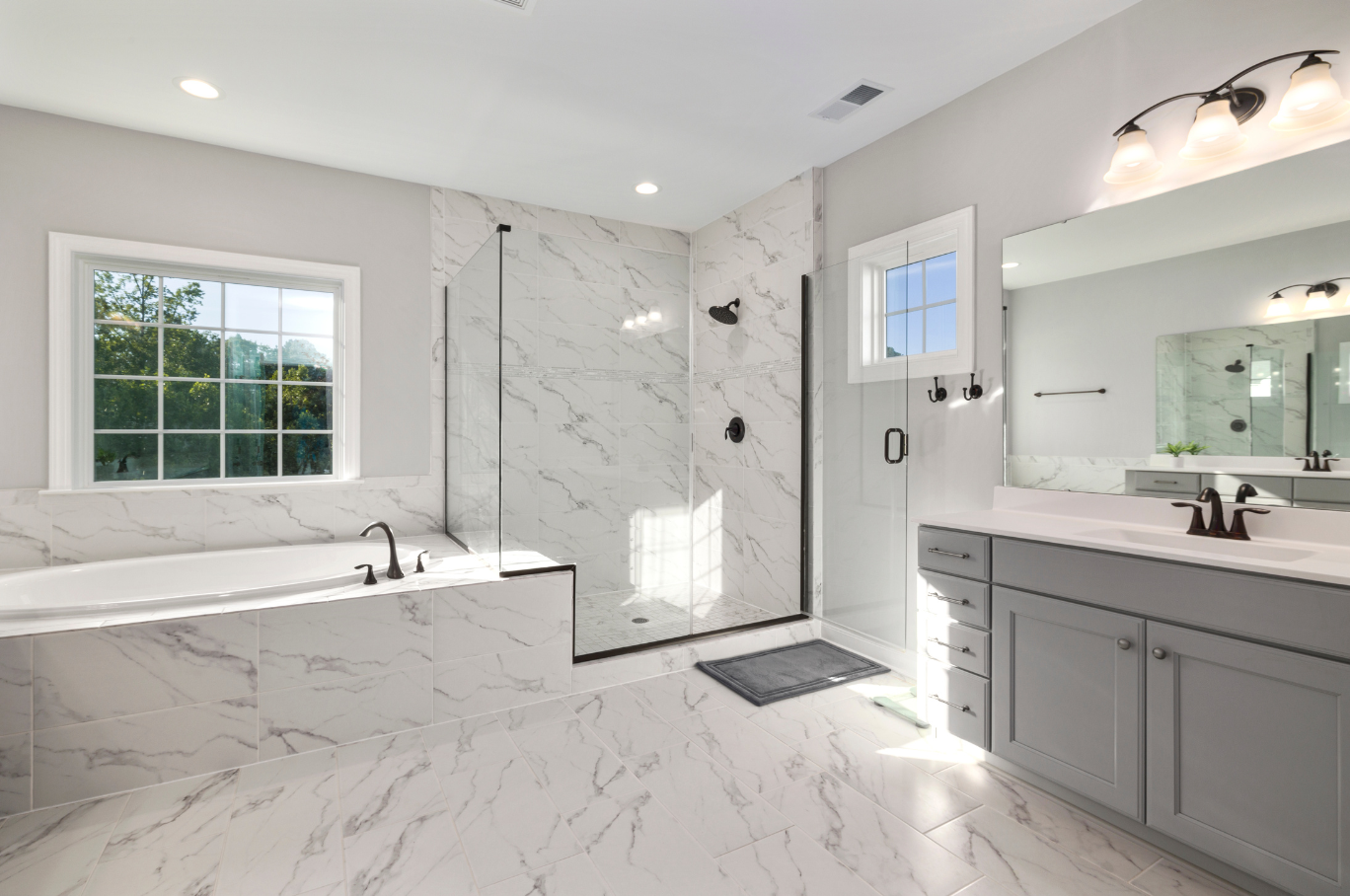
Classic Kitchen Design Ideas: Timeless Remodel Tips for Connecticut Homes
Why “Classic” Works in Connecticut
Connecticut architecture favors balance: symmetrical facades, honest materials, and well-scaled trim. A classic kitchen respects those bones. It’s not about being plain, it’s about quiet confidence: framed doors, thoughtful profiles, soft whites and woods, restrained veining, and Hardware that feels substantial in the hand. The result is a space that complements both older homes and tasteful new builds.

Start with Flow: Layouts that Age Well
Timeless kitchens are easy to use. Before you pick finishes, please make sure your layout is settled.
Work Triangle or Work Zones
- Triangle: Keep sink, range, and fridge within an easy, unobstructed path.
- Zones: In larger kitchens, group tasks — prep, cook, clean, bake, serve —so tools live where you use them.
Aisle Clearances
- 42” between the island and the perimeter is a sweet spot for two cooks.
- Tight room? Consider a peninsula instead of an island to keep traffic flowing.
Connecticut Realities
- Older Colonials often have narrower footprints. A well-planned galley or L-shape with a slim island preserves symmetry and storage.
- Coastal homes benefit from sandy-shoe drop zones and easy-clean surfaces near entries.
Unsure which layout fits? Share measurements and photos, we’ll sketch options and flag carpentry details that elevate the look.
Ask the pros → Carpentry & Handyman Concepts.
Cabinetry: The Backbone of a Classic Kitchen
Door Styles that Endure
- Shaker: clean rails and stiles work in traditional and transitional homes.
- Inset: doors set within the frame; premium, furniture-like look.
- Beaded face frames or a subtle raised panel can add period-correct detail.
Finish & Color
- Warm whites, creams, and soft greiges suit New England light.
- Add an accent in stain-grade white oak or walnut for the island or a hutch to keep the room from feeling sterile.
Architectural Trim
- Crown molding visually finishes upper cabinets, scale it to your ceiling height so it feels proportional.
- Light rail, end panels, and furniture feet deliver an authentic built-in vibe.
Carpenter’s Tip
Perfect reveals make the whole kitchen look custom. We scribe panels to walls, shim boxes to dead level, and cope crown so seams disappear — details DIY installs often miss.
Storage That Looks Built-In (and Works Every Day)
Classic doesn’t mean cluttered. Plan for storage that keeps counters clean:
- Full-height pantry with roll-outs for cereals, cans, and small appliances.
- Deep drawers (not doors) for pots and pans —no crouching or rummaging.
- Tray dividers above the oven for sheet pans and cutting boards.
- Spice pullouts flanking the range; a knife-block drawer near the prep.
- Appliance garage for a toaster and an espresso machine.
- A Hutch cabinet with glass uppers for serveware adds a furniture note.
Countertops: Beauty with Staying Power
Marble (Iconic, Natural)
- Carrara or Danby marble looks authentically New England.
- Seal regularly and accept a gentle patina. Classic kitchens wear their years gracefully.
Quartz (Low-Maintenance)
- Choose soft, marble-look veining over bold patterns to stay timeless.
- Mitered edges on islands create a substantial, furniture-like profile.
Butcher Block (Warm Accent)
- Great on an island or baking station. Oil finish brings back luster fast.
Edge Profiles to Consider: eased, small ogee, or subtle bevels, understated choices that won’t date the room.
Backsplash: Quiet, Clean, Cohesive
- Subway tile (2×6, 3×6, 2×8) with tight grout lines (1/16"–1/8").
- Beadboard or v-groove in a mudroom-adjacent area for cottage charm.
- Herringbone behind the range can add interest without shouting.
- Keep grout off-white or light gray for longevity.
Sinks, Faucets, and Fixtures: Classic Workhorses
- Undermount single- or double-bowl sinks for clean counter edges.
- In traditional spaces, a fireclay apron sink feels right at home.
- Bridge or single-handle arc faucets in polished nickel or unlacquered brass.
- Consider a filtered water or hot-water side tap if you make tea or cook frequently.
Hardware: Small Parts, Big Impression
- Cup pulls on drawers, simple round or mushroom knobs on doors: practical and period-friendly.
- Finishes that age nicely: polished nickel (classic sheen), unlacquered brass (develops a lived-in patina), or oil-rubbed bronze (quiet contrast).
- Keep a consistent finish family across faucet, lighting, and Hardware, or choose a deliberate two-finish plan (e.g., nickel + unlacquered brass).
Lighting: Layered and Warm
- Ambient: well-placed recessed cans or traditional flush-mounts.
- Task: under-cabinet lighting at 2700–3000K for comfortable color.
- Accent: two or three pendants over the island, glass, linen, or metal shades keep it classic.
- Put dimmers on every zone so the kitchen adapts from breakfast bright to dinner soft.
Floors that Fit New England
- Site-finished white oak (natural matte or light stain) feels timeless and hides wear gracefully.
- Stone looks (e.g., checkerboard limestone) can work in mudroom transitions; keep contrast low for longevity.
Classic Touches that Quietly Elevate
- Panel-ready appliances reduce visual noise and extend your cabinetry lines.
- A furniture-style island with legs or feet adds a touch of history even in new builds.
- A custom range hood with paneling or a subtle curve becomes a proper focal point.
- Glass fronts on a couple of uppers are used sparingly to give a collected feel.
Color Strategy for the Long Haul
- Walls: soft white or warm greige (let cabinets lead).
- Cabinets: painted perimeter + stain-grade island/hutch for depth.
- Keep contrast gentle; tight color families read calm and considered.
Budgeting & Phasing (A Smart CT Plan)
If you’re remodeling in stages, prioritize what delivers the most visual and functional impact:
- Layout & Cabinetry (highest impact; plan trim and crown now).
- Counters & Backsplash (set the tone; choose restrained patterns).
- Lighting & Hardware (layered lighting is half the magic).
- Trim Upgrades & Built-ins (finish the room and add storage).
Eight Mistakes That Date a “Classic” Kitchen
- Overly trendy door profiles or heavy, busy quartz veining.
- Skipping the crown or end panels—the room looks unfinished.
- Too many open shelves are beautiful in photos but high-maintenance in real life.
- Mixing metal finishes randomly instead of with a plan.
- Inconsistent reveal gaps lines should be laser-straight.
- No under-cabinet lighting, beautiful counters deserve a task light.
- Oversized islands in narrow rooms, traffic jams aren’t timeless.
- Using interior-grade fasteners or fillers in high-wear spots can cause premature aging.
Timeless by the Numbers: Proportions & Clearances
- Toe kick: ~4”–4.5” height keeps furniture from feeling too high.
- Upper cabinet height: 36”–42”, depending on the ceiling; install upper cabinets to the ceiling with a crown for a tailored finish.
- Island seating overhang: 12”–14” for comfort.
- Hood width: at least the cooktop width (often +3” each side in a classic look).
Connecticut-Specific Considerations
- Humidity & seasonal movement: We allow for wood expansion and contraction, especially on wide panels and long crown runs.
- Old-house walls: Out-of-square is normal; we scribe cabinets, panels, and trim so gaps vanish.
- Permitting & safety: For layout changes or wall openings, we coordinate with your GC and inspectors to ensure classic form meets modern code.
These are the details homeowners see every day, even if they can’t name them. We sweat the reveals, returns, and miters so your kitchen reads “custom.”
Talk trim, crown, and built-ins → Carpentry & Handyman Concepts
Our Process (Fast, Clean, Professional)
- Free Quote & Guidance: Share photos, dimensions, and inspiration.
- Site Measure & Plan: We finalize cabinet specs, trim profiles, and panel reveals.
- Build & Install: Clean work, tidy site, and meticulous finish carpentry.
- Walkthrough & Touch-Ups: We don’t leave until every line and door swing feels right.
Real-World Before/After Wins
- Crown & light rail: Turning standard boxes into a seamless, tailored wall.
- Re-hanging doors & panels: Perfecting reveals so shadows fall evenly.
- Hutch addition: A shallow pantry/hutch combo that looks original to the home.
- Island upgrade: Swapping a builder island for a furniture-style piece with storage and seating.
Quick FAQ
Do classic kitchens have to be all white?
No. Soft whites are perennial, but pairing them with stain-grade oak/walnut on the island or hutch adds warmth and depth.
Is marble too high-maintenance?
It patinas, but with proper sealing and realistic expectations, it’s a New England staple. Prefer low-maintenance? Choose subtle marble-look quartz.
Inset vs. overlay, what’s more “classic”?
Inset is most traditional and furniture-like. A full-overlay shaker also reads timeless when installed cleanly and with good proportions.
Can you retrofit the crown and panels on existing cabinets?
Often, yes. We add crown, end panels, light rail, and toe-kick details to give stock cabinetry a custom finish.
The Bottom Line
A timeless kitchen is about proportion, restraint, and craftsmanship. Get the layout right, choose honest materials, and finish with thoughtful trim and lighting. When you pair innovative design with professional carpentry, your Connecticut home gets a kitchen that looks meant to be there today and ten years from now.
You can call us today to get a free quote: Carpentry & Handyman Concepts.
Start Planning Your Project With A Free Quote!
Book Your Free EstimateRead our latest blog
Flexible Financing With Klarna
We’ve partnered with Klarna to make your next project stress-free. Split your payments into easy installments, enjoy transparent pricing, and get the home upgrades you need now, without waiting.
.png)
.png)
.png)

